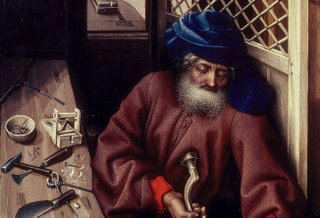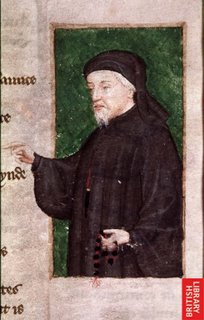
M.L. West, in his Textual Criticism and Editorial Technique, applicable to Greek and Latin Texts (Stuttgart: Teubner, 1973), tells the story of Eduard Fraenkel's traumatic experience as a young student with Friedrich Leo:
"I had by then read the greater part of Aristophanes, and I began to rave about it to Leo, and to wax eloquent on the magic of his poetry, the beauty of the choral odes, and so on and so forth. Leo let me have my say, perhaps ten minutes in all, without showing any sign of disapproval or impatience. When I was finished, he asked: 'In which edition do you read Aristophanes?' I thought: has he not been listening? What has this question got to do with what I have been telling him? After a moment's ruffled hesitation I answered: 'The Teubner'. Leo: 'Oh, you read Aristophanes without a critical apparatus.' He said it quite calmly, without any sharpness, without a whiff of sarcasm, just sincerely taken aback that it was possible for a tolerably intelligent young man to do such a thing. I looked at the lawn nearby and had a single, overwelming sensation: νῦν μοι χάνοι εὐρεῖα χθών. Later it seemed to me that in that moment I had understood the meaning of real scholarship." Fraenkel is right of course, true scholarship is about getting the detail right, from which the large picture may be drawn. His epiphany about the nature of real scholarship I think also has something to do with modesty, about realizing how little you know. And there is something important in the gentleness of Leo, in his patience and humane treatment of his young and brilliant student; literae humaniores indeed.
Last week I invested in Petrocchi's Commedia secondo l'antica vulgata. It was published in four volumes between 1966-7 with Mondadori in Milan, and has now been republished with Le Lettere in 1994 as "Seconda ristampa riveduta". This might best be translated as a "corrected reprint edition". Pp. v-vii in Vol. 1 (Introduzione) explains what has been changed:
Purg. IV 132 per ch'io ➛ perch'io
XV 18 salendo su ➛ salendo sù
XXI 9 giù surto ➛ già surto
XXVIII 91 lo sommo Ben ➛ lo sommo ben
Par. XI 62 et coram patre ➛ e coram patre"I had by then read the greater part of Aristophanes, and I began to rave about it to Leo, and to wax eloquent on the magic of his poetry, the beauty of the choral odes, and so on and so forth. Leo let me have my say, perhaps ten minutes in all, without showing any sign of disapproval or impatience. When I was finished, he asked: 'In which edition do you read Aristophanes?' I thought: has he not been listening? What has this question got to do with what I have been telling him? After a moment's ruffled hesitation I answered: 'The Teubner'. Leo: 'Oh, you read Aristophanes without a critical apparatus.' He said it quite calmly, without any sharpness, without a whiff of sarcasm, just sincerely taken aback that it was possible for a tolerably intelligent young man to do such a thing. I looked at the lawn nearby and had a single, overwelming sensation: νῦν μοι χάνοι εὐρεῖα χθών. Later it seemed to me that in that moment I had understood the meaning of real scholarship." Fraenkel is right of course, true scholarship is about getting the detail right, from which the large picture may be drawn. His epiphany about the nature of real scholarship I think also has something to do with modesty, about realizing how little you know. And there is something important in the gentleness of Leo, in his patience and humane treatment of his young and brilliant student; literae humaniores indeed.
Last week I invested in Petrocchi's Commedia secondo l'antica vulgata. It was published in four volumes between 1966-7 with Mondadori in Milan, and has now been republished with Le Lettere in 1994 as "Seconda ristampa riveduta". This might best be translated as a "corrected reprint edition". Pp. v-vii in Vol. 1 (Introduzione) explains what has been changed:
Purg. IV 132 per ch'io ➛ perch'io
XV 18 salendo su ➛ salendo sù
XXI 9 giù surto ➛ già surto
XXVIII 91 lo sommo Ben ➛ lo sommo ben
XII 59 viva vertute ➛ viva vertute,
with a couple of these changes having appeared in the 1975 "Piccola Biblioteca Einaudi" text produced by Petrocchi. All modern editions and commentaries on the Commedia reproduce the Petrocchi edition, (the editions of Lanza and Sanguineti have not yet made an impact), but I was getting more and more impatient checking variants in the library. Some things you just need to have right beside you, all the time. The variants really are how the text was read as well as copied, so the criticus apparatus is as valuable to those interested in reception history as it is to textual critics.


